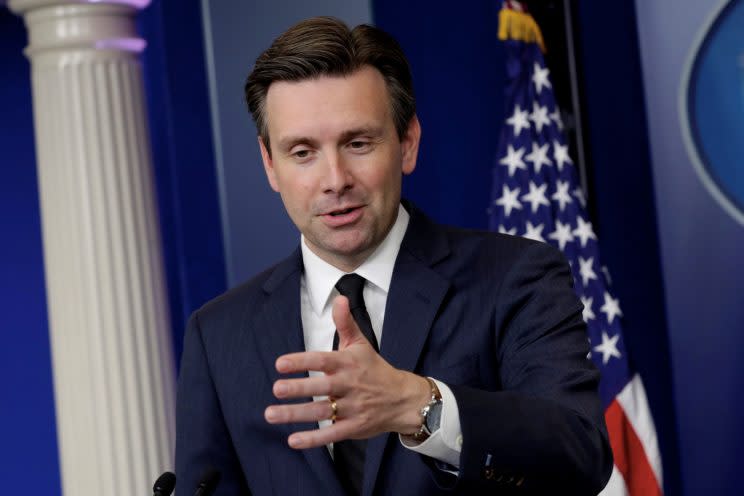White House chides Trump for Taiwan call

The White House on Monday scolded Donald Trump over his controversial telephone call with Taiwan’s leader, charging that the president-elect had broken with four decades of bipartisan foreign policy consensus and angered China without reaping any benefits for the United States.
“It’s unclear exactly what the strategic effort is, what the aim of the strategic effort is, and it’s unclear exactly what potential benefit could be experienced by the United States, China or Taiwan, but I’ll leave that to them to explain,” press secretary Josh Earnest told reporters at his daily briefing.
Trump riled Chinese officials and raised eyebrows at home when he spoke by telephone Friday with Taiwan’s president, Tsai Ing-wen. Since 1979, no other U.S. president or president-elect is known to have spoken directly with any leader of Taiwan, which Beijing regards as a renegade province due for reunification with the mainland, by force if necessary. Official U.S. policy is to profess a belief in “one China,” while opposing both unilateral changes in the status quo — either annexation or a declaration of independence — and providing Taiwan with weapons to deter or try to fend off an invasion. Beijing opposes even symbolic steps, like Friday’s telephone call, that lend legitimacy to Taiwan’s self-government. There have been news reports that President Obama’s administration could provide Taiwan with another weapons package before he leaves office next month.
In the face of a backlash, Trump and some of his top aides played down the call’s significance. On Twitter, the president-elect portrayed the conversation as a simple “congratulatory call,” placed by Tsai. Asked on NBC’s “Meet the Press” whether Trump was charting a new foreign policy course, Vice President-elect Mike Pence delivered a flat denial. “No,” Pence told moderator Chuck Todd, “this was a courtesy call.” Former Trump campaign manager KellyAnne Conway, asked on Fox News Sunday whether the president-elect was signaling a new policy or merely taking a telephone call, replied: “It was just a phone call at this point.” Incoming White House chief of staff Reince Priebus on CBS described the conversation as a courtesy call and not a “massive deviation of our policy.”
But the Washington Post cited Trump transition sources as saying that, at the staff level at least, the conversation was long-planned and designed to signal a harder line on China. And Trump has promised a tougher stance toward Beijing both on trade and over territorial ambitions that make the Asian giant’s neighbors nervous, notably the construction of artificial islands in the South China Sea.
Did China ask us if it was OK to devalue their currency (making it hard for our companies to compete), heavily tax our products going into..
— Donald J. Trump (@realDonaldTrump) December 4, 2016
their country (the U.S. doesn't tax them) or to build a massive military complex in the middle of the South China Sea? I don't think so!
— Donald J. Trump (@realDonaldTrump) December 4, 2016
Obama’s conservative critics have long complained that he has done too little in response to those moves and to alleged Chinese cyberattacks on the United States, and that it’s time for a more robust approach. And some have noted that the president has broken with other decades-old U.S. policies, either with his outreach to Cuba or his nuclear negotiations with Iran.
At the White House, senior officials said they received no heads-up about Trump’s call but have worked to reassure Beijing. Since Friday, top Obama aides have had at least two telephone conversations with top Chinese officials to assure them that, until Jan. 20 at least, there will be no major shift in policy. The outgoing president has praised China’s help in the landmark Paris climate change accords that he hopes will be a significant part of his legacy.
“Some of the progress that we have made in our relationship with China could be undermined by this issue flaring up,” Earnest suggested. “It’s also unclear how the people who live in Taiwan benefit from this issue flaring up.”
Earnest said that the four-decade consensus had helped the United States improve its relations with China while ensuring that Taiwan could thrive.
“If the president-elect’s team has a different aim, I’ll leave it to them to describe,” he said.



